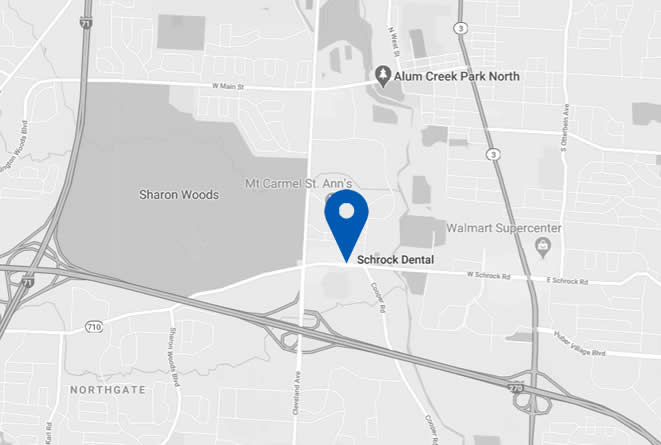
Due to the increased interest in cosmetic dentistry, many family dentists are becoming trained to offer more extensive procedures and treatments geared to improve the appearance of your smile. Many of these treatments are quick and painless, and can offer almost instant results. Some of the cosmetic dentistry options offered by your family dentist may include:
- Professional teeth whitening to improve the color and brightness of dark, dingy, or discolored teeth
- Placement of dental veneers to improve the look of gapped, stained, or crooked teeth
- Replacement of old or unattractive metal fillings with more natural, tooth-colored materials
- Placement of crowns and bridges to repair and replace missing or severely damaged teeth
- Correction of small spaces or gaps between teeth by bonding with tooth-colored composite resin
- Insertion of dental implants to replace missing teeth
- Straightening of teeth and correction of bite problems with braces or Invisalign
Because your family dentist is already aware of your family’s dental history, it will be simple to recommend treatment plans. With this knowledge, your dentist can also quickly and expertly assess if you or other members of your family are suitable candidates for the procedures you are seeking. Your family dentist can perform all the same services as both a pediatric dentist and a general dentist, and will be able to address the cosmetic dental concerns of every member of your family. Family dentists can provide advice as to which procedures are age appropriate and give guidelines for when treatment is recommended.
If anyone in your family is not pleased with the appearance of their teeth, consult first with your family dentist to find out what cosmetic dental procedures and treatments are offered to improve the quality of their smile.
If you need a dentist in Westerville contact us today

Most people who bite their nails wish they didn’t do it. If you’re a nail biter, you probably know that it spreads germs and leaves your nails looking unattractive. But did you know that it can harm your teeth? Let’s find out the connection between nail biting and tooth damage, and learn some ways to stop this nasty habit.
What does nail biting do to my teeth?
Just like chewing on hard items like ice, nails are hard and put stress on your teeth when you bite down on them. With time, your teeth will weaken and your teeth can chip or break. Since nail biting is a repetitive habit, constant chewing on your teeth wears them down faster than they should. Your teeth also can become more sensitive when the enamel is worn down. Additionally, biting your nails can move your teeth out of place. Your gums are at risk too from the additional stress the nail biting puts on them, eventually leading to gum disease and even tooth loss.
What if I wear braces?
Braces already add pressure on your teeth, so nail biting can stress them even more. The roots of your teeth can be weakened, which leads to problems like tooth loss.
How can I stop biting my nails?
Here are some tips to help you stop the nail biting habit:
- Get a hobby that uses your hands, like video games, knitting, or painting.
- Occupy your mouth by chewing sugarless gum, sucking on mints, or eating carrot sticks.
- Add foods to your diet containing calcium and magnesium because they help repair and grow your nails.
- Cover your nails with tape, petroleum jelly, fake nails (for girls), or foul-tasting liquid.
- Get manicures to make your nails look nice, so you will be less inclined to bite them.
If you need a dentist in Westerville contact us today

Preserving the bone in your jaw and face is of utmost importance to your cosmetic dentist, and as such, treatments that preserve bone are preferred over those that lead to bone shrinkage, known as resorption.
Dental implants preserve bone by mimicking the tooth’s natural roots, stimulating and preserving the bone. As part of the healing process following surgical placement, the jawbone fuses directly to the implant. Most often made of titanium, dental implants provide a very stable foundation for a replacement tooth. This foundation is so stable that it can serve as an anchor point for dental bridgework and will feel, look, and function as your natural tooth would.
The process of implant to bone fusion is known as “osseointegration.” Fusion is primarily dependent upon the quality of bone surrounding the implant, and can be achieved in three to nine months following dental implant treatment. Excessive smoking or drinking can stunt the healing process and lead to complications.
Because bone resorption is prevented with dental implants, your facial structure will not collapse and your facial shape will not change. Missing teeth that are replaced by implants avoid other problems commonly associated with tooth loss, including other teeth shifting into the open spaces created by the missing teeth, and functional problems with the jaw joints and bite alignment.
Once a tooth is extracted or falls out, a great deal of the bone in the area will shrink, or resorb over the coming year. Shrinkage occurs in a horizontal as well as vertical dimension. Most resorption occurs within the first two to three months following tooth loss. When a cosmetic dentist replaces that tooth immediately with a titanium dental implant, the bone fuses around the implant, significantly reducing bone shrinkage.
Dental implants are the only restorative treatment that preserves and maintains bone. Dentures and partial dentures can accelerate the process of bone shrinkage as a result of pressure on the underlying mouth structures as you talk or eat.
We treat patients from Westerville and the surrounding area

Are you looking to improve your smile but you don’t have a lot of time? Have you heard that smile makeovers are invasive and time-consuming? There are many options available to you for your smile makeover that are relatively short and sweet. If you are in good health but want to make improvements to your smile, these fast and easy options may be right for you.
Teeth bleaching (also known as whitening) is an extremely popular and very simple therapy for quickly brightening your smile. Many common foods and drinks we consume daily can slowly dim your smile by discoloring or staining your tooth enamel. Having your teeth whitened by your dentist can lighten your teeth by as many as ten levels in a single office visit, saving you time and effort.
Composite bonding can repair small problems like cracks, chips or irregular shapes in one visit. Bonding is done by hand by your dentist and requires excellent technique and materials, as well as the skill needed to match your natural tooth color.
Perhaps you need a little more extensive work done to achieve your dream smile, but you don’t have the time. Your dentist may be able to offer you a “snap-on” smile. This is a thin appliance that is placed on top of your natural teeth using nothing but your teeth as an anchor – no adhesives are necessary. These snap-on teeth can be made to mimic a celebrity’s teeth, or just better, straighter, whiter versions of your own. They can stay in all day during your regular activities, allowing you to get the benefits of a beautiful smile without the time of a more invasive treatment.
Talk to your dentist today about the treatments you can have done in a single office visit. Your friends, family and coworkers might not be able to immediately identify what “work” you had done, but you can rest assured everyone will notice your change in attitude and your gorgeous smile.
We look forward to seeing you in our Westerville dental office

After suffering tooth loss for any reason, it’s important to restore your mouth’s function and appearance with restoration options through your dentist. In the past, many patients have gotten dentures for this purpose. Dental implants provide a newer and very popular option. If you already have dentures but aren’t completely satisfied with them, is it possible to change to dental implants instead?
The answer is yes! Of course, you need to consult your dentist to make sure that you are a good candidate for implants. There are a number of reasons that denture wearers might decide that implants are a better solution to their tooth replacement needs. Some patients find dentures to be uncomfortable because they don’t stay in place securely or they irritate the gums. Some find a more permanent remedy to be more appealing than dentures, and implants do provide a long-lasting solution to tooth loss. If patients with dentures don’t like them and aren’t wearing them consistently, they aren’t achieving the goal of restoration.
There are some additional complications that can occur with dentures, making implants more appealing. Trouble speaking and eating is a hazard if the dentures slip, as well as jawbone loss and increased wrinkles. Some patients even alter their diets due to problems eating certain foods. The increased dental hygiene regimen also bothers some patients who are unwilling to do the extra tasks required.
If you dislike your dentures, consider making the switch to dental implants. It might restore your self-confidence as well as your mouth’s function and appearance.
If you need a dentist in Westerville contact us today

Denture technology has come a long way since the days of George Washington and his wooden teeth. Unfortunately, people still lose teeth for a variety of reasons including periodontal disease, trauma, and decay. Missing teeth make talking and eating difficult, and can ultimately cause sagging facial muscles. However, with today’s advances in technology it is more possible than ever to replace those lost teeth with natural and comfortable dentures.
Complete dentures cover both upper and lower jaws. The options for complete dentures range from immediate dentures to highly customized implant dentures. Immediate dentures are pre-made and available at your dentist’s office. They are not custom fitted and are set into gum sockets immediately upon removal of your teeth. While these offer the convenience of walking immediately out of the dental office with your new teeth in place, once gum tissue heals and swelling reduces they may shift and become loose. This issue requires follow-up visits for your dentist to make adjustments. People with immediate dentures may also have difficulty speaking, or experience a “clicking sound” when talking.
Conventional full dentures can be made 8 to 12 weeks after tooth loss or removal. Once the gums have healed, your dentist takes a series of impressions of your mouth to be sent away to a dental lab to create your dentures. This process may require multiple visits to your dentist to ensure a proper fit and correct bite. While this process takes longer and is more involved than immediate dentures, you will achieve a more secure and personalized fit. Both conventional and immediate dentures require the use of denture adhesives to keep them securely in place.
For an even more custom, natural looking and secure denture option, implant dentures are an excellent alternative. With implant dentures, small implants are placed in the jaw where they heal in place surrounded by the bone. The denture then snaps into the implant with attachments under the denture. These attachments keep the denture stable, providing more comfort and confidence. You do not have to worry your dentures will slip or fall out while you are eating, talking, or laughing. Implant dentures do not require the use of any denture adhesives.
Talk to your dental professional to determine the best use of denture technology to ensure many years of a confident and comfortable smile.
Our dental office is located in Westerville











